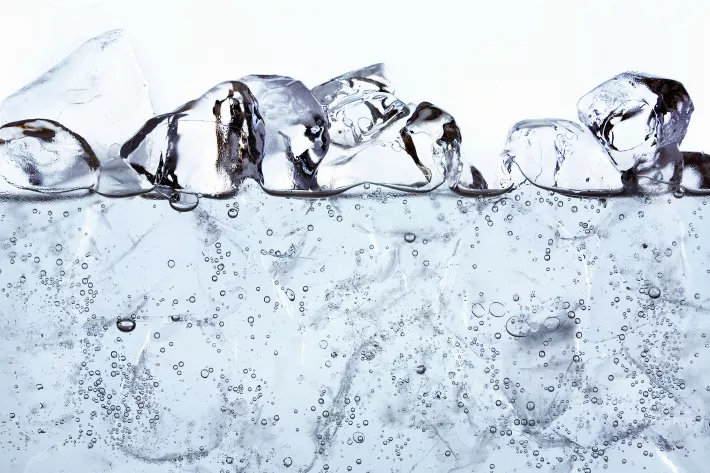Although I don’t drink much soda (or, as they call it where I grew up, “pop”), I do enjoy drinking sparkling, or carbonated, water and often recommend it as a healthful alternative to soda. But several of you have written with concerns that drinking carbonated water might be bad for you.
Is Carbonated Water Bad for You?
Sure enough, I did a quick Internet search and found several websites warning that drinking carbonated water will leech calcium from your bones, causing osteoporosis. Others claimed that carbonated beverages can harm the enamel on your teeth, irritate your stomach, or even cause cancer. Let’s sort fact from the fiction.
Does Carbonated Water Leech Calcium from Your Bones?
Soda consumption—particularly cola consumption—has been linked to lower bone mineral density. However, it’s pretty clear that it has nothing to do with the carbonation itself. Researchers had one group of women drink one liter of still water every day while another group drank a liter of carbonated water. After eight weeks, the researchers could detect no difference between the groups when it came to markers for bone turnover.
In fact, the most recent research suggests that the reason people who drink a lot of cola have weaker bones is not because something in the soda is robbing calcium from their bones, but because they tend to have lower calcium intake.
Does Carbonated Water Harm Your Teeth?
When carbon dioxide is dissolved in water, small amounts of carbonic acid are formed, making the water slightly more acidic. However, when researchers soaked human teeth in various still and sparkling waters, they found that neither were harmful to the teeth. As I talked about in my article on mineral water, most water—even tap water—contains small amounts of calcium and other minerals and these minerals buffer the effects of the carbonic acid and protect the tooth enamel.
This is not true of flavored soda water, by the way. The flavoring agents make the soda water significantly more acidic and these flavored seltzers could contribute to dental erosion. And of course, soft drinks like Coke and Pepsi are also quite acidic and will definitely erode tooth enamel. In the fifth grade, one of my classmates submitted a project for a science fair in which she placed some of her baby teeth in vials of Coke. Over the course of a few days, they largely disappeared. Her project, memorably titled “Rot Your Teeth,” won an Honorable Mention at the fair.
Drinking plain club soda, seltzer, or mineral water however, does not damage tooth enamel.
Does Carbonated Water Damage Your Throat or Stomach?
Drinking fizzy water may make you burp. Etiquette issues aside, burping can relieve symptoms of indigestion.
Carbonated water will not hurt your stomach. In fact, many people find that drinking a little carbonated water is a good way to settle an upset stomach. And there are some studies to support this. Researchers took a couple dozen people with chronic indigestion and divided them into two groups. One group drank a liter and a half of still water every day and the other group drank a liter and a half of carbonated water. After two weeks, almost all of the people who were drinking carbonated water reported less indigestion, and many also reported relief from constipation. The other group saw little to no improvement.
Drinking fizzy stuff often makes people burp and—etiquette issues aside—this sometimes relieve feelings of pressure in the stomach and other symptoms of indigestion. If you have trouble with acid reflux, however, things that make you burp can make those symptoms worse, and this is why people with reflux are often advised to avoid carbonated beverages—including seltzer and mineral water.
Does Drinking Water Dilute Stomach Acid?
As long as I’m in myth-busting mode, let me also reassure you that drinking water with your meals—whether still or carbonated—will not dilute your stomach acid or prevent you from digesting your food. And, contrary to that email that occasionally makes the rounds, drinking ice water with meals will not cause fats to congeal in your stomach and cause stomach or colon cancer. Once you drink it, ice water is fairly quickly brought to body temperature.
Now it is true that bringing cold water to body temperature burns a few extra calories. But, as I discussed in my article on negative calorie foods, in terms of weight loss strategies, drinking cold water is really the long way around the block. Taking a brisk walk around the block would be a lot more effective!
What Are the Benefits of Drinking Carbonated Water?
To sum up, although soda and other carbonated beverages have been associated with negative effects, carbonation is not harmful in and of itself. Drinking carbonated water offers the same benefits as drinking plain water. It keeps you hydrated, which (among other things) helps prevent constipation. Drinking water can reduce your appetite and help you eat less at meals. And depending on the source of the water, it may contain minerals that help strengthen your bones and teeth.
For more on benefits of water, see my article on How Much Water Should You Drink?
Keep in Touch
If you have a suggestion for a future show topic or would like to find out about having me speak at your conference or event, send an email to nutrition@quickanddirtytips.com. You can also post comments and questions on my Nutrition Diva Facebook Page. I answer a lot of listener questions in my free weekly newsletter, so if you’ve sent a question my way, be sure you’re signed up to receive that.
RESOURCES:
- Still and sparkling mineral water and dental erosion. (Journal article)
- Effect of flavored soda water on tooth enamel. (Journal article)
- Carbonated water relieves indigestion and constipation (Study summary)
- What is carbonic acid? (A little chemistry lesson from WiseGeek.com)
Carbonated Water image from Shutterstock




